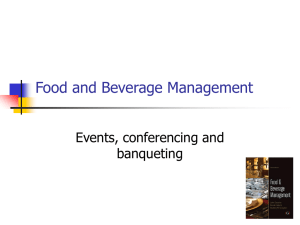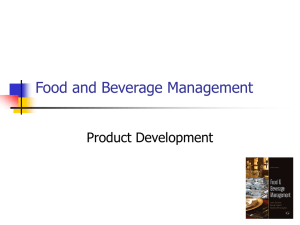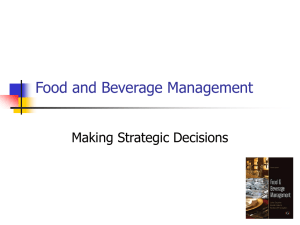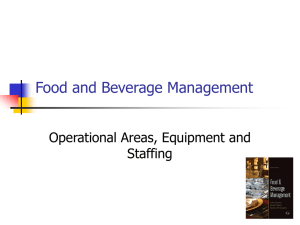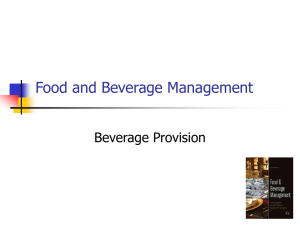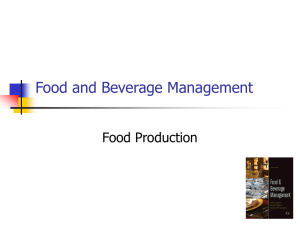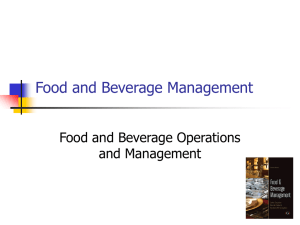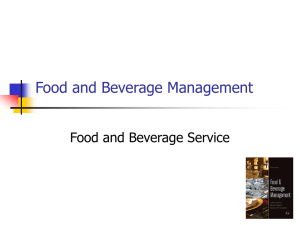Chapter 9 - Goodfellow Publishers
advertisement
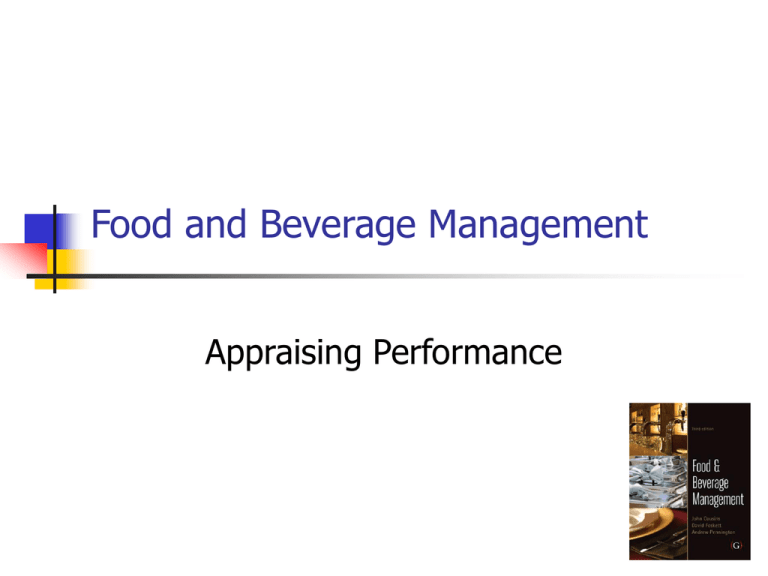
Food and Beverage Management Appraising Performance Performance appraisal Revenue Costs Profits The product © 2011 Cousins et al: Food and Beverage Management, 3rd edition, Goodfellows Publishers Fundamentals of appraisal Knowing goals and objectives Placing a value on a measurement Being prepared to make decisions © 2011 Cousins et al: Food and Beverage Management, 3rd edition, Goodfellows Publishers Basis of appraisal Established aims and objectives Existing budgets Existing standards required © 2011 Cousins et al: Food and Beverage Management, 3rd edition, Goodfellows Publishers Effect of changes in price and volume © 2011 Cousins et al: Food and Beverage Management, 3rd edition, Goodfellows Publishers Spend per head and average check © 2011 Cousins et al: Food and Beverage Management, 3rd edition, Goodfellows Publishers Key points of revenue appraisal Revenue is product of price and volume Appraisal needs to take account of changes in both price and volume Averages not always accurate and prone to misinterpretation Allow for inflation and/or price rises Need to compare like with like Incorporate 12-month rolling totals to determine true trends and performance Revenue cannot be fully appraised by itself © 2011 Cousins et al: Food and Beverage Management, 3rd edition, Goodfellows Publishers Appraising costs Fixed costs Variable costs Semi-variable costs © 2011 Cousins et al: Food and Beverage Management, 3rd edition, Goodfellows Publishers Change in costs and revenues © 2011 Cousins et al: Food and Beverage Management, 3rd edition, Goodfellows Publishers Industry norms for cost percentages © 2011 Cousins et al: Food and Beverage Management, 3rd edition, Goodfellows Publishers Key points of cost appraisal Structures vary, and change over time Can be measured in cash or percentages Proportional relationship between costs Relationship between costs and inflation Cross-sectional and time-series analyses useful 12-month rolling totals identify true performance Operators with the lowest costs perceived as having a key advantage Allocating indirect costs more complex than allocating direct costs © 2011 Cousins et al: Food and Beverage Management, 3rd edition, Goodfellows Publishers Profitability measures Gross profit Operating profit Net profit Net operating profit Departmental and unit profit Yield © 2011 Cousins et al: Food and Beverage Management, 3rd edition, Goodfellows Publishers Example profit and loss account © 2011 Cousins et al: Food and Beverage Management, 3rd edition, Goodfellows Publishers Comparison of gross profits © 2011 Cousins et al: Food and Beverage Management, 3rd edition, Goodfellows Publishers Comparison of operating profits * Costs will include ingredient costs and staff cost. The extent to which other costs have been included needs to be established © 2011 Cousins et al: Food and Beverage Management, 3rd edition, Goodfellows Publishers Yield comparisons © 2011 Cousins et al: Food and Beverage Management, 3rd edition, Goodfellows Publishers Relationship between revenue, costs and profits © 2011 Cousins et al: Food and Beverage Management, 3rd edition, Goodfellows Publishers Comparison of GP in relation to revenue © 2011 Cousins et al: Food and Beverage Management, 3rd edition, Goodfellows Publishers Comparison of cash GP and GP % © 2011 Cousins et al: Food and Beverage Management, 3rd edition, Goodfellows Publishers Potential cash GP and GP % © 2011 Cousins et al: Food and Beverage Management, 3rd edition, Goodfellows Publishers Effect of changed sales mix © 2011 Cousins et al: Food and Beverage Management, 3rd edition, Goodfellows Publishers Sales mix example (beverages) © 2011 Cousins et al: Food and Beverage Management, 3rd edition, Goodfellows Publishers Example of profitability calculations © 2011 Cousins et al: Food and Beverage Management, 3rd edition, Goodfellows Publishers Popularity and profitability ranking © 2011 Cousins et al: Food and Beverage Management, 3rd edition, Goodfellows Publishers Menu engineering matrix Adapted from Kasavana and Smith 1999 © 2011 Cousins et al: Food and Beverage Management, 3rd edition, Goodfellows Publishers Menu engineering matrix Adapted from Kasavana and Smith 1999 © 2011 Cousins et al: Food and Beverage Management, 3rd edition, Goodfellows Publishers Comparison of net operating profit measures © 2011 Cousins et al: Food and Beverage Management, 3rd edition, Goodfellows Publishers Key points of profit appraisal Be clear how profit measures are contrived Compare like with like Appraise against objectives to give value Setting objectives includes subjective judgements Sales mix analysis determines real trends Profit percentages measure efficiency, not profitability Cash contribution is what is being sought Comparison with industry norms us useful Use rolling 12-month totals to indicate true performance Take account of stakeholders’ priorities © 2011 Cousins et al: Food and Beverage Management, 3rd edition, Goodfellows Publishers Appraising the product Approaches include: Measuring customer satisfaction Complaint monitoring Staff focus groups Mystery shopper Process reviews Quality audits Quality standards analysis © 2011 Cousins et al: Food and Beverage Management, 3rd edition, Goodfellows Publishers Customer importance / operational achievement matrix © 2011 Cousins et al: Food and Beverage Management, 3rd edition, Goodfellows Publishers Customer importance / operational achievement matrix © 2011 Cousins et al: Food and Beverage Management, 3rd edition, Goodfellows Publishers Customer importance / operational capability matrix © 2011 Cousins et al: Food and Beverage Management, 3rd edition, Goodfellows Publishers Customer importance / operational capability matrix © 2011 Cousins et al: Food and Beverage Management, 3rd edition, Goodfellows Publishers Customer importance / staff importance matrix © 2011 Cousins et al: Food and Beverage Management, 3rd edition, Goodfellows Publishers Customer importance / staff importance matrix © 2011 Cousins et al: Food and Beverage Management, 3rd edition, Goodfellows Publishers
